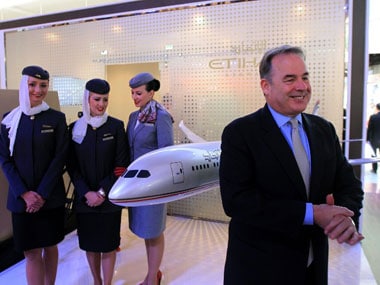New Delhi: Parliamentary Standing Committee has said what we have been saying all along: that something is not quite right in the generosity shown by the Ministry of Civil Aviation while quadrupling bilateral traffic rights with Abu Dhabi. But minister Ajit Singh is most unlikely to pay heed to either warnings in the media or apprehensions expressed by a bunch of Parliamentarians.
India and Abu Dhabi recently agreed to allow each other’s airlines to offer 36,670 seats a week against 13,300 till now. This entitlement will increase further each year for the next two years till the airlines of both countries can offer over 50,000 seats a week.
The decision has been widely criticized because Indian airlines use only about 65% of the existing entitlements and because Abu Dhabi’s flag carrier Etihad Airways has paid 32% premium in acquiring 24% equity in Jet Airways ostensibly to get flying rights into India.
While Jet will gain substantial benefit from such a massive increase in flying rights to Abu Dhabi as it can carry passengers from small towns and cities in India to Abu Dhabi and fly them onwards to Europe and Americas through Etihad. This will deny other Indian airlines a share of this lucrative traffic.
[caption id=“attachment_759779” align=“alignleft” width=“380”] Why were the bilateral rights at all under negotiation between India and Abu Dhabi when current entitlements with Indian airlines had not been fully utilised? Reuters[/caption]
Why were the bilateral rights at all under negotiation between India and Abu Dhabi when current entitlements with Indian airlines had not been fully utilised? Reuters[/caption]
Impact Shorts
More ShortsThe Department Related Committee on Transport, Tourism and Culture headed by Sitaram Yechury has asked some uncomfortable questions in its report, which was tabled in Parliament last week.
In some places Yechury has used indirect references to question the ministry’s bilateral policy:
- Why were the bilateral rights at all under negotiation between India and Abu Dhabi when current entitlements with Indian airlines had not been fully utilised?
India has exchanged air access and capacity rights with 100 countries but the UAE seems to have been accorded a special status since India negotiates with each emirate of the UAE (Dubai, Abu Dhabi, Sharjah and Ras al Khaimah) separately.
The increase in bilateral capacity put the premium that Ethihad paid (32% to market price in buying stake in Jet Airways) in perspective. The report says that this huge premium could be a backhanded way of obtaining access to the huge Civil Aviation market in India.
The same situation was created when the ministry allowed massive increase in flying rights to Dubai based Emirates and this airline now carries more Indians than an Indian airline overseas.
India is already struggling to create a world class hub at Delhi, faced with competition from airports like Dubai and Doha in the Gulf and Bangkok, Hong Kong and Singapore in South East Asia. Allowing Abu Dhabi to come up as another hub which is only about a three hours flight away from major Indian metros might have adverse impact on efforts to establish a world class hub in India.
The Parliamentary panel has suggested that the increased flying rights be kept in abeyance till Indian airlines have enough muscle and capacity to compete with the likes of Etihad. It has also suggested that the Government take away three slots of Jet Airways at London Heathrow which the airline earlier sold to Etihad. The panel says slots are national property and airlines have no right to sell these. It has also suggested that Air India be given the first right of refusal in any bilateral rights.
But no one in the Ministry of Civil Aviation is expected to pay heed to this sane advice of the committee. Keeping a bilateral and ensuing flying rights in abeyance is unheard of. Besides, Jet Airways has already started new flights from smaller towns and cities to Abu Dhabi where passengers will be offered onward connections so the use of newly-acquired bilateral rights has already begun.
In its defense, the ministry of civil aviation has already said two things:
Air India will not be impacted and actually competition on Gulf routes would now be between Emirates and Etihad. It says AI offers non-stop flights to the US and connections to Europe from Delhi which remain lucrative.
Not all flying rights will be given to Jet. Airlines will once again be asked for their individual requirements and based on their capacity expansion plans flying rights would be allotted.
It has said nothing on whether any action would be taken against Jet for selling slot to Etihad even before the deal was signed. Also, privately, ministry officials also speak of how several other ministries of this Government were pushing for this bilateral increase and how the UAE has promised much more investment into India through government-owned sovereign funds etc. But there is really no explanation for the inordinate hurry in which negotiations with Abu Dhabi were concluded and sealed the very day that Etihad announced its investment in Jet Airways at a significant premium.
)